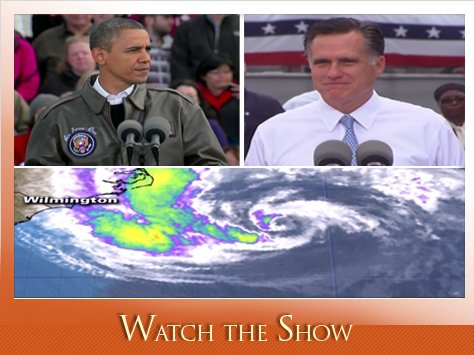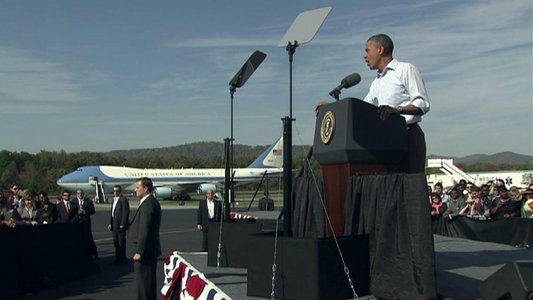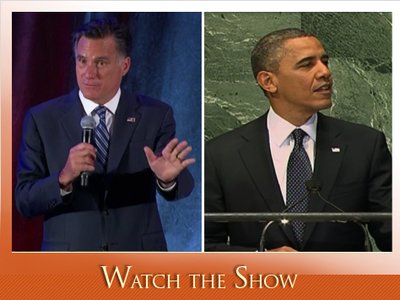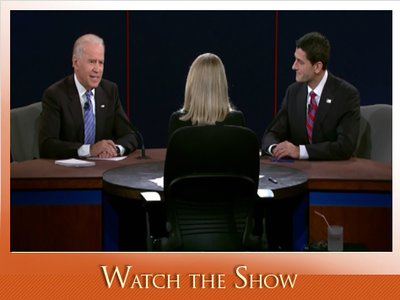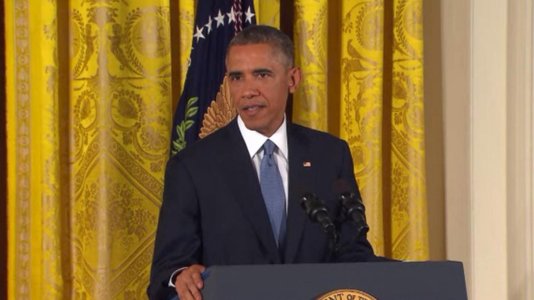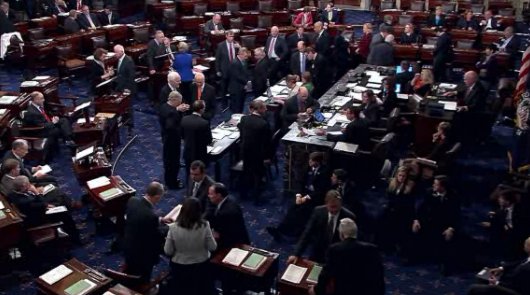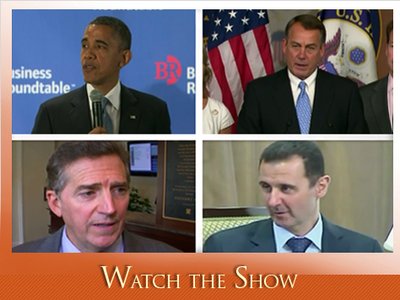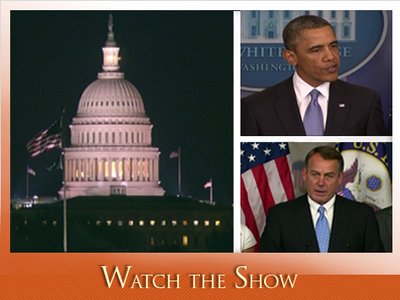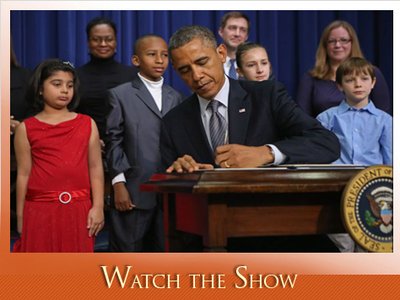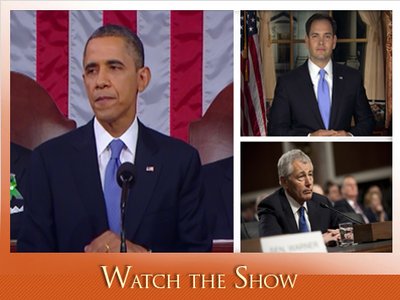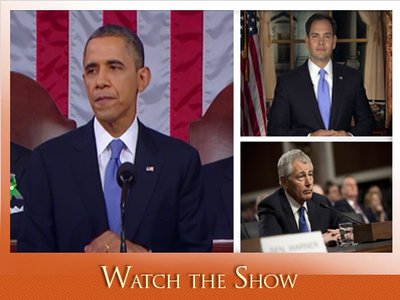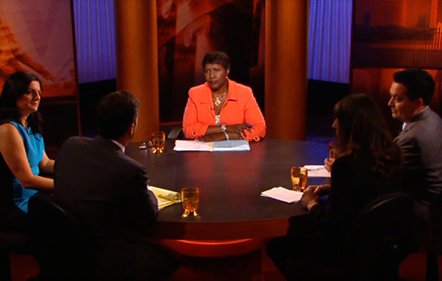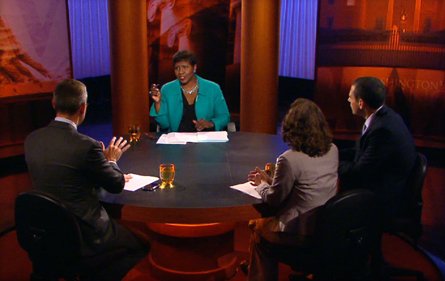In our last show before Election Day, we take a look at the final campaign sprint in a close election. Also, Hurricane Sandy hit the eastern United States and influences the last week of the race. Also, a look at the new unemployment numbers. Joining Gwen: Jackie Calmes, New York Times; John Harris, Politico; John Harwood, CNBC and New York Times; Amy Walter, ABC News.
GWEN IFILL: Countdown, where the race stands as it enters its last weekend. What happens when all the ads stop, tonight, on “Washington Week.”
The candidates’ final pitch. Who really owns hope and change?
MITT ROMNEY [REPUBLICAN NOMINEE FOR PRESIDENT]: (From tape.) The question of this election comes down to this: do you want more of the same or do you want real change? And we bring real change.
PRESIDENT BARACK OBAMA: (From tape.) We know what change looks like and what the governor’s offering ain’t it?
MS. IFILL: The polls can’t predict it. The crowds can’t guarantee it and even the early voters can’t win it.
VICE PRESIDENT JOE BIDEN: (From tape.) Folks, look, we’ve seen this movie before, and it ended in the great recession of 2008.
REPRESENTATIVE PAUL RYAN (R-WI) [REPUBLICAN NOMINEE FOR VICE PRESIDENT]: (From tape.) We know what this movie looks like at the end of the movie. Turn on the TV and look at Europe.
MS. IFILL: A tossup election, complete with its own October surprise. Unpredictable political embraces.
PRESIDENT OBAMA: (From tape.) If they need something, we figure out a way to say yes.
NEW JERSEY GOVERNOR CHRIS CHRISTIE (R): (From tape.) I cannot thank the president enough for his personal concern and compassion for our state and for the people of our state.
MS. IFILL: Then, today, 171,000 new jobs add to mostly good economic news. Now, it’s up to you.
Covering the week Jackie Calmes of the New York Times, John Harris of Politico, John Harwood of CNBC and the New York Times, And Amy Walter of ABC News.
ANNOUNCER: Award-winning reporting and analysis, covering history as it happens, live from our nation’s capital, this is “Washington Week with Gwen Ifill” produced in association with “National Journal.”
(Station announcements.)
ANNOUNCER: Once again, live from Washington, moderator Gwen Ifill.
MS. IFILL: Good evening. So this is it. The Obama campaign says it’s winning and the Romney campaign says it’s winning. And to be quite honest, we can’t tell you who’s right, but tonight, we’ll lay out the choices. Mitt Romney, looking presidential in a blue suit and teleprompter, told thousands of supporters in Wisconsin today the next four days count.
MR. ROMNEY: (From tape.) The only thing that stands between us and some of the best years we’ve known is lack of leadership. That’s why we have elections after all. This Tuesday is a moment to look into the future and imagine what we can do to put the past four years behind us and start building a new future.
MS. IFILL: And Barack Obama looking presidential yesterday in a bomber jacket and Air Force One said Romney is not worth the risk.
PRESIDENT OBAMA: (From tape.) After four years as president, you know me by now. You may not agree with every decision I’ve made. You may be frustrated at the pace of change. But you know what I believe. You know where I stand. You know I’m willing to make tough decisions, even when they’re not politically convenient.
MS. IFILL: Let’s start by assessing these closing arguments. John, you know me by now can work both ways, right?
JOHN HARWOOD: Well, it can work both ways, but for this president, who’s personally popular and has been for much of his term, that’s not a bad closing argument. He also got a decent bit of economic news with the jobs report, came in about 46,000 over what the consensus forecast had been. And so he’s casting this as we’re slowly going in the right direction. We’re on the right track. We’ve been through difficult times. And Mitt Romney’s closing argument, of course, is we haven’t gone far enough and we haven’t gone fast enough. And they both have reasonable arguments and it’s why they’re tied in the polls.
MS. IFILL: Now, Amy, it’s not unusual for candidates to say I’m the candidate of change. We have heard it time and time again. It is more unusual in this particular race because Barack Obama made it such a big deal four years ago, and now Mitt Romney’s trying to appropriate that.
AMY WALTER: Right and it’s always nice when you’re the challenger because, of course, you are the change. You embody that. But what’s even more interesting, I think, about this closing argument is the fact that after the most negative campaign that we’ve seen probably in our lifetimes, they are closing with this very soft sell to independent voters, saying, you know, I can break the gridlock. That’s what I’m going to do. I’m going to come together. It’s okay that there are Republicans, Democrats. I’m going to be the one that can get us beyond that.
And so it’s two things. One, as I said, is to appeal the independents, but another piece of it is the growing realization that Congress is going to be divided, regardless of who is elected president and this next president has to deal with a divided government.
MS. IFILL: John, I wonder how much of this also is about economic optimism. And today’s jobs numbers can play into that, but also we’ve seen for some time people saying they feel good about the economy, even if they don’t necessary trust the president on the economy as much.
JOHN HARRIS: That’s been trending somewhat in the positive direction. I see these job numbers today basically being status quo. They don’t affect things in a big way. The decimal point ticked up one point, but as John said, the actual job number was a little higher than forecast. Mitt Romney has overall, according to most polls, won the economy – not by a huge margin, but he’s won it. Generally that’s a good thing for a challenger. He’s won the issue of bipartisanship. I think President Obama’s trying to close some of that ground. But people who say that the ability to capture the center is important to them, they seem to be tilting a little bit in Mitt Romney’s favor. Those are good fundamentals. They don’t make up, in my mind, as best we can tell, for the very formidable Electoral College math that is working much more in President Obama’s favor.
MS. IFILL: What are you thinking about that, Jackie?
MS. CALMES: I agree. I mean, we could very well be looking at – we’re all sort of talking and gaming at an Electoral College victory for the president, who loses the popular vote.
MS. IFILL: Does anybody really think that’s going to happen?
MR. HARRIS: I do, yes.
MS. IFILL: You do or you’re wishing for it to happen?
MR. HARRIS: Well, we are journalists. We love chaos. But I do think it’s – it’s certainly probable – it’s certainly possible and I think bordering in some ways to (our problem ?).
MS. CALMES: Well, you look at New York, New Jersey, Connecticut, three blue states that have been hit by a terrible storm this week. That’s surely going to cut into the vote in those states. It won’t affect the electoral vote, but it’s certain to take on net some votes away from Barack Obama.
MS. IFILL: And yet, I heard today, there was record voter registration in California, a place which is also not one of the targeted states, but which could drive up the popular vote.
MR. HARWOOD: I would say the odds of a popular vote, electoral vote split remain small. Could happen. I don’t think it’s likely to happen. And I must say, on the point that Amy raised about bipartisanship and the promise of bringing the two sides together, that has got to be the one promise that has so thoroughly been proven empty for two presidencies in a row. Remember, George W. Bush was a uniter, not a divider. He came in and we saw what happened there. And then, Barack Obama comes in with the same kind of promise and the political scientists say, well, now this is – George Bush was the most polarized presidency in history. Now, under Barack Obama, we have the most polarized presidency. It’s a condition of life and what Obama’s hoping is that Republicans, if he’s reelected, sort of collapse a little bit in exhaustion and work with him for a short period of time.
MS. WALTER: And regardless of whether it’s a popular-electoral split, it’s going to be very close and almost 50 percent of the country is going to feel incredibly disenchanted, with whoever’s elected and the fault lines are going to be quite amazing. I mean –
MS. IFILL: Well, let’s talk about where we are right this moment. This time last week, it felt like it was a little bit of momentum or whatever word do you want to use, heading in Mitt Romney’s direction. Crunch some polls for me, Amy, where are they tonight?
MS. WALTER: Well, I think you’re right. There was some momentum still building off that really successful Denver debate, and then, it sort of hit the reality of two more debates after that and the continuing campaign. And I think that this momentum was starting to slow before the hurricane hit, but certainly the hurricane had a piece of this. The fact that the president gets to look presidential. Right, you saw – you had him up there with his bomber jacket and Air Force One –
MR. HARWOOD: And Chris Christie next to him.
MS. WALTER: And yes, getting endorsement from a Republican, which –
MS. IFILL: Wait, he wasn’t endorsed by Chris Christie. He was endorsed by independent Mayor Mike Bloomberg.
MS. WALTER: That’s right. Although, to be fair, I don’t know that many people in Ohio or Iowa or Nevada care about that at all. And that’s why we keep coming back to, when we talk about crunching the numbers, John is exactly right, that in our own polling and then in the other national polls, it is a point, one way or the other, 49-48, 48-49, whatever, very, very close. But you look at those battleground states, and there has not been a poll out of Ohio in months that has shown Mitt Romney’s ahead. And so that’s where – that’s why these guys are spending so much time in Ohio, Wisconsin, in Iowa, that’s where this election will be decided.
MS. IFILL: John.
MR. HARRIS: And Mitt Romney’s not going to be president unless he outperforms the polls. If there’s some reason that the polls are not capturing the intensity behind Mitt Romney’s supporters or in some way they’re exaggerating President Obama’s support. Again, just to echo Amy’s point.
MS. IFILL: Where is the intensity right now? Is it with the Republicans or the Democrats?
MR. HARRIS: That is the –
MS. WALTER : We had it equal. I mean, in our poll it’s just – they’re equally inspired, but that’s – exactly right.
MS. CALMES: Republicans think they have an advantage there.
MR. HARWOOD: But just proportionately with white voters, which is where Mitt Romney is getting about 60 percent of the vote. African-Americans are also pretty energized, but Latinos, which the president is dominating, are not. Young voters, which the president is dominating, are not. Both of those are underperforming in terms of interest in the election and motivation. And that’s where the president’s challenge is. He’s got to make sure that he can harvest all the voters that shows up in these polls from Latinos and from young voters.
MR. HARRIS: Gwen, just to follow on Amy’s point. Barack Obama sprang at sort of national celebrity in 2004 with that speech about we’re one America, not red America, not blue America, not white, black. This election, to me, really puts the lie to that. If he wins, he’s going to win because he was the president of black America, Hispanic America, single white women, overwhelmingly. If Mitt Romney –
MS. IFILL: If he gets under 40 percent of the white vote, he will – I think John Kerry got that amount. It’s not just –
MR. HARRIS: No, I mean – it’s not just the fact that President Obama is African-American. We’re just a deeply, deeply polarized America. We’re so far from his ideal vision that he laid out in 2004. To get less than the mid-30s, according to some polls, of the white vote is astonishing. That’s a lower percentage of the white vote than George W. Bush won of the Hispanic vote in 2004.
MS. IFILL: Well, I haven’t seen either campaign seem to be terribly concerned about that. They just want to win at all costs. And they seem to be exploiting that. So do we see any kind – everybody says it’s just a matter of who shows up, about the enthusiasm. As we watch get out to vote efforts and we watch voter disputes and the lawyers being dispatched around the country, is there anything happening sub-rosa that we don’t see that shows up in the polls, is there any way to know?
MS. WALTER: So this is the difficult part about this election. It is the first election we’ve had since 2004 that’s, quote, unquote, “normal.” 2006 was a wave, 2008 was a wave, 2010 was a wave. So everybody saw basically the same data and we were just disagreeing – the two sides were disagreeing and those of us who were on the table were disagreeing just around the margins. Now, both sides have a fundamentally different view of what the electorate’s going to look like, or on John’s point. And it’s not just – I have these conversations with the campaigns, the presidential campaigns, but also talking to Republicans who are doing Senate races, Democrats who are doing their own independent polling. They, too, are coming up with polls that look like they’re from different planet. So Democrats, Republicans, very different idea of what this electorate’s going to look like. What is the new normal post-three wave elections.
MS. IFILL: Let’s boil it down to Ohio, Jackie’s native state, where they’re spending – where Mitt Romney is tonight as we speak here, where Barack Obama is going and coming back. What – is it true that Ohio is where all of this turns on?
MS. CALMES: That’s – I would say, yes, right, but we have been surprised so many times in elections. And it was in 2004. I remember I was in Columbus, Ohio, for election night in 2004. And I guess I’d have to predict that the president will win it for the very reasons Amy was saying.
MS. IFILL: Ooh, that’s scary. You made a prediction. (Laughs.) That’s right. I got it on tape now. I can roll it back. But I wonder if it plays into that demographic divide we’re just talking about. Does it – is it the example of what we’re talking about?
MR. HARWOOD: Well, it’s actually different.
MS. CALMES: That’s an exception to the rule.
MR. HARWOOD: It’s actually different.
MS. IFILL: Why?
MR. HARWOOD: Well, the white vote falls differently in the state of Ohio than it does in other places. Blue color whites –
MS. IFILL: The auto bailout.
MR. HARWOOD: The auto bailout, the fact that Mitt Romney opposed the auto bailout, and also his characteristics as a very wealthy financial executive who’s been pounded by Democratic ads in a very concentrated way. That sort of changed the chemistry of that state, which Republicans have never won the presidency without winning. I do think Ohio is likely to be the decisive state, but only if some of the other big states fall the way that we expect. If President Obama wins in Florida, for example, and moots the importance of Ohio.
MS. CALMES: Yes, I can see Florida being central.
MR. HARWOOD: But what I’ve heard Democrats talk about is a check mate strategy of if they can hold Ohio, hold Wisconsin, Paul Ryan’s home state, where the president has a lead, though a narrow one, hold Nevada, they could lose all other swing states, lose the congressional district in Maine that’s awarded by an individual district, and come out with exactly 270 electoral votes.
MR. HARRIS: You add it up that way, too, John?
MR. HARRIS: I mean – that sounds very (plausible to ?) me. What I am struck by is there hasn’t really been any mystery about this. If you go back, look at story the year ago, even further than a year ago, President Obama’s team was very straightforward about what they planned to do. They expected that it would be Mitt Romney as a nominee. They said they’re going to make him unacceptable, taking advantage of the Bain background, the wealthy and out of touch background. They did that and they had a very precise targeted, micro-targeted, micro-message strategy, very much the opposite of the broader hope-and-change message of 2008. They said what they were going to do and stuck to that strategy, it seems to me, with remarkable discipline. If it works, they look really, really smart. The difference between being really smart and really dumb is going to be –
MS. CALMES: Exactly –
(Cross talk.)
MS. WALTER: And that’s what’s remarkable, though, is that they broadcast that, right?
MS. CALMES: Right.
MS. WALTER: And the Romney campaign never or their allies – and his allies never came up to say, boy, if they’re going to do this, we should probably define Mitt Romney. We better get out there and define him positively because they’re going to dump all this stuff to make him look –
MS. IFILL: And when they did have the fuel to do that at their convention, they fell short.
MS. WALTER: They did and they had these Super PACs. I mean, you look at the amount of money that has been spent in these battleground states, just millions and millions of dollars, most of it from the Super PACs and from the Romney campaign, negative ads against President Obama, but very little of it defining Mitt Romney positively when they knew they’re going to come after him on Bain and all of those issues.
MS. IFILL: In the Republican primary that very same thing had happened already.
MS. WALTER: That’s right.
MS. CALMES: I mean, Mitt Romney’s profile was just the wrong profile for the state of Ohio. But that said, in the southeast quadrant, where you’re virtually Appalachia and West Virginia, the coal country, they have done a very aggressive job at depicting the president as having a war on coal. And if they can get out the vote quite heavily and get out their vote in southeast Ohio, they make a difference.
MS. IFILL: Not like they don’t elect Republicans in Ohio. How about the independents? We were all supposed to be watching for the independents and where they were going to go. Do we have any sense of that, John?
MR. HARWOOD: Mitt Romney’s been doing better with President Obama among independents in many of the polls. The question is what is the nature of those independents and how has the campaign itself caused people to identify themselves with one part or the other and not as independents anymore. So the independents that we’re talking about in 2012 may not be the independents that we were talking about in 2008, but that gets to some of the disagreement among pollsters.
It’s all about measuring who is a likely voter and how accurate those models are going to be. People use different sets of variables to forecast to those who are going to be, and if in fact, as the Romney campaign and some of the Republican analysts say, that we’re going to see a much closer to even balance between Democrats and Republicans, that would allow the independents to tilt the outcome of the race, if in fact the polls that we’ve been measuring, which show, 3, 4, 5, 6 points in the Democrats’ favor in terms of people who identify with the party turning out, then Obama’s in much better shape.
MS. IFILL: Jackie, after this election is over, assuming it ends these days, the fiscal cliff still looms –
MS. CALMES: Fisticuffs – I thought you were going –
MS. IFILL: Fisticuffs, well, it could be. So how – what difference will it make, depending on who’s elected, what happens with – in a lame duck session which would begin the following week?
MS. CALMES: It makes so much difference that the people in the background, the policy types virtually can’t plan for it without knowing who the president’s going to be. If you have – if President Obama gets reelected, I think he basically knows what he wants to do. The question is what is he – how quickly he goes out with a plan. He’s got on the shelf his so-called fiscal framework that’s roughly – people dispute the numbers, but $4 trillion, like Simpson-Bowles. It’s a mix of spending cuts, including in entitlements and taxes. Will he put that down and tweak it some in a way that gives a concession to Republicans to show his good faith, bring them to the table, and get something done fast? And in doing something like that, getting the bipartisan support to de-trigger, defuse this fiscal cliff, all of these spending cuts and tax increases that would otherwise happen at the end of the year.
If it’s Mitt Romney who gets elected, I think what every – he doesn’t have that kind of plan on the shelf and we all know how vague his economic plan has been in his campaign. I think there will be – he will ask for and probably get agreement to, as they say, kick the can down the road –
MS. IFILL: Assuming the Senate stays where it is and the House stays where it is.
MS. CALMES: Exactly. And they’ve talked about delaying things for at least a year to give him time to put down his plan. And the markets will probably accept that.
MR. HARRIS: To me, the question if we have an Obama victory is does Senator Mitch McConnell come out chastened, saying, look, it’s time to cut the deal and also what does Paul Ryan think? He’s going to be the darling of Republicans and he is the one that’s going to be the decisive factor, probably more than Speaker John Boehner, in whether a grand bargain is acceptable or unacceptable to the conservative base.
MS. IFILL: No matter who wins, do we think that the well that is poisoned with Congress and the executive branch could be unpoisoned?
MR. HARWOOD: I think so. Look, I’m reasonably optimistic about the prospects that there will – once we put the campaign behind us, something is going to happen. It’s probably easier for that to happen if Obama is reelected, Boehner returns as speaker, and Harry Reid returns as the Senate leader, because they’ve been in this before. I think President Obama’s first call would be to John Boehner to resume some of those grand bargain talks. I suspect he would tweak his plan to lay down some sort of concession to Republicans. And Alan Simpson told me some months ago that he thought if Obama was reelected, having tried for a very long time to stop him politically and failed to do that, Republicans for a brief moment would say we’ve got to do a little business with him, and then they would move on.
MS. IFILL: We have to just touch on the biggest story of the week, which was actually the Superstorm Sandy. And I wonder in the end – I know at the beginning I thought to myself, well, the blue – in a purely crass political way, only blue states were affected and that’s not going to change the outcome, but I do wonder, given what we saw with Christie, what we saw with Bloomberg this week and the president, whether that in the end, by freezing the race, didn’t redound to the benefit of the incumbent.
MR. HARRIS: Probably in a small way, but we’re in a point, as we’ve been talking the whole show, where a small – can have – potentially big consequences.
MS. CALMES: And then you think of the opposite of that, if there had been anything at all go wrong and the president was seen as not performing as well as he seems to be –
MS. IFILL: Yes, we’ve seen that backfire before.
MS. CALMES: That would have been a problem.
MS. WALTER: And really through the Romney campaign off, too. I mean, you could see they couldn’t quite figure out what do you do when you’re a challenger in a time of crisis, right? You can’t –
MS. IFILL: We’ve seen that happen a lot with John McCain and the financial crisis.
MS. WALTER: Right, but there neither was the incumbent.
MS. IFILL: That’s true.
MS. WALTER : And now it’s different –
MR. HARWOOD: It changed polls very much and I don’t think it will before the end, but it does give a little tail wind to the closing bipartisan argument that Barack Obama is trying to make, just as Mitt Romney’s trying to make it.
MS. CALMES: Right. And meanwhile, while Barack Obama had to cut back on his – some of his campaign travel for three days, his surrogate was Bill Clinton, who was about as good as a surrogate as you can hope for to get out there and get the base –
MR. HARWOOD: They did not stop trying to win votes on those days.
MS. CALMES: No.
MS. IFILL: Two other questions for you. One is, this week we saw talk of an expanded map. Pennsylvania, Minnesota, is that true?
MR. HARWOOD: No.
MS. WALTER: No, it’s not going to work. They could try it.
MS. IFILL: Which is to say Republicans are saying, hey, we can win Pennsylvania. Democrats are – and they’re saying we can win Minnesota, and you don’t believe that that’s getable for them.
MS. WALTER : Do I believe that it’s tighter than it was –
MS. IFILL: Yes.
MS. WALTER: – earlier? Yes. Do I think that –
MS. IFILL: Is it shrinking fast enough?
MS. WALTER: Is it going to shrink fast enough in a time? No and partly because when you think about those states, what do they have in common – it goes right back to what we were just talking about – the demographics of those states are much more favorable to Mitt Romney, right? A state like Minnesota, which is almost 90 percent white in terms of its –
MS. IFILL: So why isn’t it gettable?
MS. WALTER: There has been very little work done to sort of –
MS. IFILL: Laying the groundwork.
MS. WALTER: Exactly.
MR. HARWOOD: It may be slightly more likely than Jim Messina’s plan a year ago to expand the map into Arizona and Georgia, but not a lot more likely.
MS. IFILL: Well, and the other question I have for you guys is – so how late are we going to be up on Tuesday?
MR. HARWOOD: I think we’ll know it by midnight.
MS. IFILL: You think?
MR. HARWOOD: Yes.
MS. IFILL: What do you think?
MS. WALTER: Wow, that is very good. Okay, I hope that is true. I don’t feel like we’ve known at midnight –
MS. IFILL: Ever – a long time.
MS. WALTER: – for a long time. Well, I mean, in 2008, we did. But if this tracks with 2004, where it’s very close and it comes down to Ohio and there’re all these rules about provisional ballots and when they can be counted and how long you can – I think that the morning of November 7 th we won’t have an answer.
MS. IFILL: Quickly, Jackie.
MS. CALMES: I’m going to predict and hope for an early night. I’m not a journalist who likes this much drama.
MS. IFILL: Like John does, yes.
MR. HARRIS: Gwen, Yogi Berra said predictions are hard, especially about the future. But I actually – (laughter) – agree with John. This is going to break one way or the other. We’re not going to have – it’s not going to – the dime’s not going to land on its side. It’s going to go one or the other and we’ll know by midnight.
MS. IFILL: That was not even bold. I will be here at this very – practically at this very table and I will be here as long as it takes, kind of. Thank you, everybody. We have to go now, but we’ll be talking about the tossup Senate races to watch online in the “Washington Week Webcast Extra.” That’s at pbs.org/washingtonweek. And later tonight, join us along with our colleagues at the PBS “NewsHour,” “Frontline” and “Need to Know” for a PBS election special “What’s At Stake.” Check your local listing for the time.
Then, on Tuesday, join Judy Woodruff and me for a wall-to-wall PBS “NewsHour” special election coverage all night long if that’s what it takes. And we’ll see you next week on “Washington Week.” Good night.
